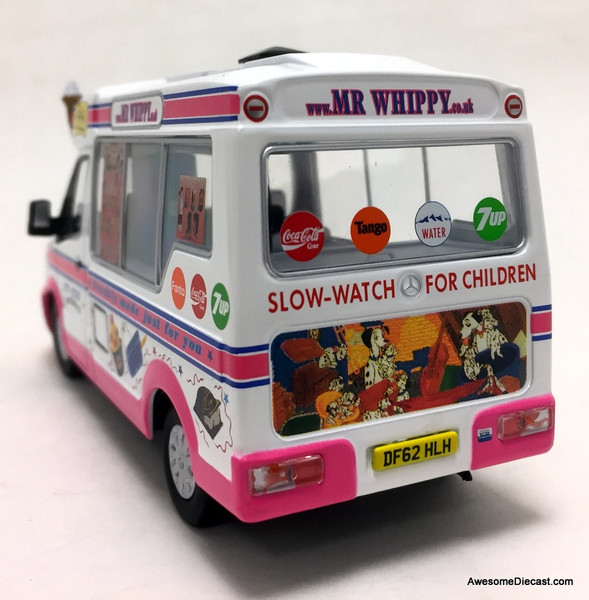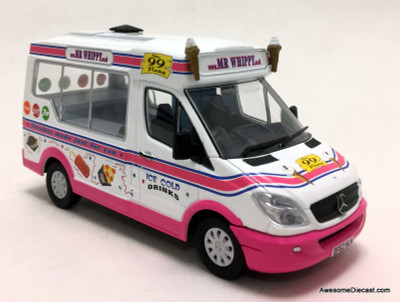Oxford Diecast
Oxford 1:43 2012 Whitby Mondial- Mercedes Benz Ice Cream Van: Mr Whippy

Oxford 1:43 2012 Whitby Mondial- Mercedes Benz Ice Cream Van: Mr Whippy
€25.57
Founded by Bryan Whitby in 1962 Whitby Morrison is recognised as the world’s leading manufacturer of ice cream vehicles.
From a purpose built factory in Cheshire, England, Whitby Morrison produce bespoke ice cream vans and associated vehicles for the global market.
Today’s business is driven forward under the stewardship of Managing Director Stuart Whitby with the support his two sons (Operations Manager) Edward and (Production Manager) Kristopher.
The management team are supported by a unique, dynamic and highly skilled workforce. They offer equal influence in ensuring that Whitby Morrison produce, and offer, the finest products and support available within the ice cream mobiling industry.
This particular model is based on a Mercedes Benz
An ice cream van (British) or ice cream truck (American) is a commercial vehicle that serves as a mobile retail outlet for ice cream, usually during the summer. Ice cream vans are often seen parked at public events, or near parks, beaches, or other areas where people congregate. Ice cream vans often travel near where children play — outside schools, in residential areas, or in other locations. They usually stop briefly before moving on to the next street. Along the sides, a large sliding window acts as a serving hatch, and this is often covered with small pictures of the available products, with their associated prices. Most ice cream vans tend to sell both pre-manufactured ice pops in wrappers, and soft serve ice cream from a machine, served in a cone, and often with a chocolate flake (in Britain) or a sugary syrup. While franchises or chains are rare within the ice cream truck community (most trucks are independently owned/run), some do exist.
In some locations, ice cream van operators have diversified to fill gaps in the market for soft drinks, using their capacity for refrigerated storage to sell chilled cans and bottles.
Ice cream vans are often brightly decorated and carry images of ice cream, or some other adornment, such as cartoon characters. They may have painted-on notices, which can serve a commercial purpose ("Stop me and buy one!") or a more serious one ("Don't Skid on a Kid!") - serving as a warning to passing motorists that children may run out into the road at the sight of the van, or appear without warning from behind it. A distinctive feature of ice cream vans is their melodic chimes, and often these take the form of a famous and recognizable tune, usually in the United States "The Mister Softee Jingle", "Turkey in the Straw", "Do Your Ears Hang Low?, "Pop Goes The Weasel", "The Entertainer", "Music Box Dancer", "Home on the Range", "It's a Small World", a tune from the opera Le devin du village more commonly known as the American folk song "Go Tell Aunt Rhody", "The Picnic" (a Japanese children's song usually played with a recording of a young woman saying 'hello' at the beginning of the song on ice cream trucks), or "Camptown Races"; or, in Australia, New Zealand and the United Kingdom, "Greensleeves", "It's Now Or Never (song)", "Whistle While You Work" in Crewe and Nantwich, "You Are My Sunshine" in Vale Royal, "Teddy Bears' Picnic" in Sheffield, and "Match of the Day" in other places. In some places in the US, ice cream trucks play the song "Ice Cream" by Andre Nickatina (essentially just Turkey in the Straw with bass).
There are mainly two types of ice cream vans in the United Kingdom: a hard van, which sells scoop ice cream and is only equipped with a freezer and a soft van, which has a freezer and also a soft serve "whippy" machine for serving ice cream cones and screwballs. They are usually converted from factory standard vans with the rear cut away and replaced with a fibre glass body (to reduce the weight). Because of the British climate, running an ice cream van profitably is not only very difficult outside summer, but is also an unpredictable business. A summer heatwave can provoke a massive upturn in fortunes for a few days, but after the weather has returned to a milder character sales drop off dramatically. The need to take advantage of rare and short-lived opportunities can result in fierce rivalry between ice cream vans in coterminous areas, with the main disputes being over who is entitled to sell ice cream in a particular 'patch'. This has also led to some ice cream van vendors diversifying and selling other products such as crisps, chips, burgers or hot dogs from their vehicles at other times of the year.
In a number of Local Authority areas, particularly in London Boroughs with existing street markets, street trading regulations prohibit ice cream vans from remaining in one static location. The legislation also contains powers to ban ice-cream vans from specific streets. Proposals in the current London Local Authorities Bill would allow only 15 minutes trading per vehicle per street each day. There also exists a nationwide code of practice for the use of chimes, which limits the volume to 80 dB and the duration to four seconds, but these are rarely observed nor enforced. Chimes must not be played more often than every three minutes, near hospitals, schools and churches when they are in use.
Also in Scotland, ice cream vans have been used to sell smuggled cigarettes and, in the 1980s Glasgow Ice Cream Wars, as front organizations to sell illicit drugs.














